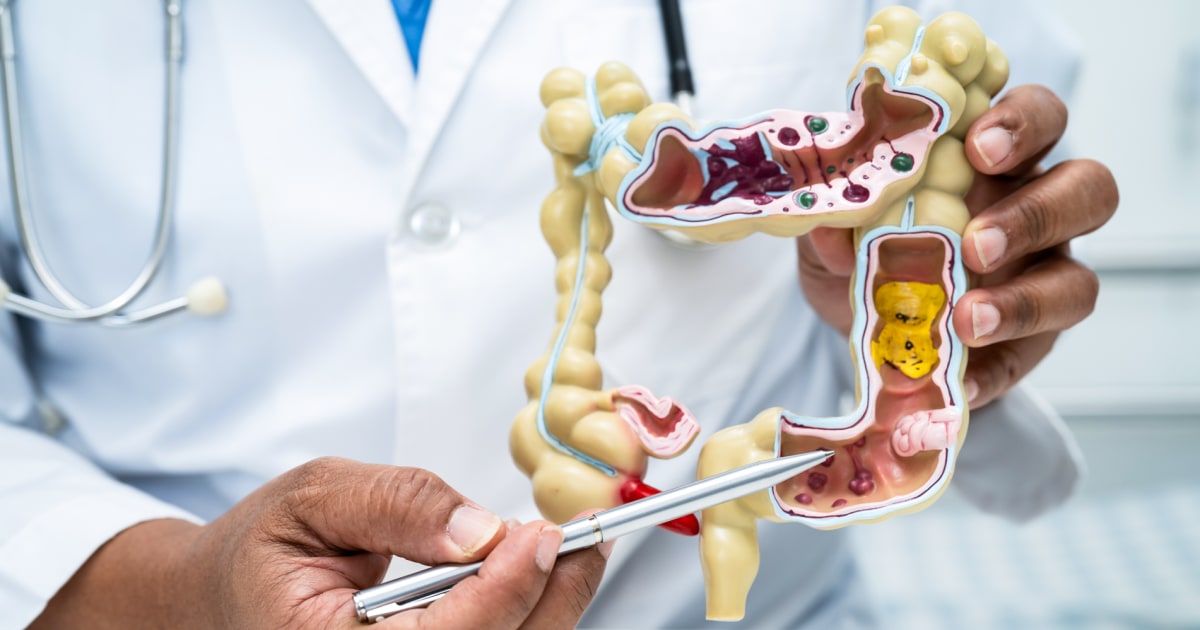Colon cancer is the third most common tumor disease in Germany.
If symptoms and signs are interpreted correctly at an early stage, there is a good chance of recovery.
Frankfurt – Colon cancer is the second most common cancer in women and the third most common cancer in men in Germany.
It is one of the deadliest types of cancer.
Colorectal cancer is an insidious disease because it usually develops insidiously and causes no or only unspecific symptoms for a long time.
The first noticeable signs are usually not very typical.
They can also occur with other bowel diseases.
If detected early, however, the chances of a cure for colorectal cancer are promising.
It is therefore all the more important to take possible symptoms seriously.
In most people, no specific trigger for colorectal cancer can be identified.
For this reason, statutory health insurance offers all insured persons the opportunity to take part in colorectal cancer screening.
Colon Cancer Symptoms: Which Signs You Should Take Seriously
Colon cancer often causes no symptoms at first and can therefore go unnoticed at first.
It is therefore often only recognized at a later stage.
However, there are some warning signs that the body sends out to look out for.
Sometimes it manifests itself, for example, in abdominal pain or a change in bowel habits.
+
A cancer cell.
(symbol photo)
© Panthermedia / iLexx / Imago Images
The MSD Manual listed the following symptoms for colorectal cancer:
Weakness and fatigue
– for some people this is the only symptom.
Pain:
Painful bowel movements and cramping abdominal pain independent of bowel movements.
Digestive problems:
constipation (problems with bowel movements), frequent, loud bowel noises and flatulence, frequent nausea or feelings of fullness despite not eating enough.
Conspicuous stool:
blood in the stool, mucus admixtures.
A feeling that the rectum has not completely emptied after a bowel movement.
Sometimes the cancer blocks the colon, causing symptoms of
bowel obstruction
, such as
B.
Vomiting, cramping abdominal pain,
or a
swollen abdomen
.
If you notice one or more of these signs of colon cancer, you should see a doctor.
However, it is important that
even if you have one or more of these symptoms of colon cancer, it does not necessarily mean that you actually have colon cancer.
According to
GESundheitsinformation.de
, the symptoms can also be caused by various other diseases.
These include, for example, irritable bowel syndrome, inflammation of the stomach lining (gastritis), a stomach ulcer, food intolerance, hemorrhoids or an inflammatory bowel disease.
Non-specific symptoms can indicate colon cancer
According to the cancer information service of the German Cancer Research Center (dkfz), unusually
reduced performance
and
frequent tiredness
, as well as repeated
slight fever
and
night sweats
can generally indicate a tumor disease.
If the disease is more advanced, then other symptoms can be added.
If the tumor bleeds regularly, some patients develop
anemia
.
They are then often very pale and tired.
Unwanted
weight loss
can also occur.
Colorectal cancer: cause and risk factors
How is colon cancer caused and what are the risk factors of the disease?
According to the MSD Manual, different factors can play a role:
Polyps (abnormal growths) in the colon.
A bowel disease such as
B. Ulcerative colitis (chronic disease that leads to inflammation of the large intestine) or Crohn's disease.
Strongly one-sided diet: Eating a lot of fat, meat and industrially processed foods and little fiber.
Relatives who already suffer from colon cancer or colon polyps.
In addition to certain previous illnesses and genetic factors, the risk factors include above all an unhealthy lifestyle:
Little movement
overweight
Regular smoking
excess of alcohol
Certain dishes and foods can also increase the risk of cancer, according to studies.
Because colon cancer is common, doctors recommend screening for a colon cancer before it causes symptoms.
Screening for colorectal cancer usually begins at age 45 or earlier if people have certain risk factors.
Colorectal cancer: Early diagnosis and regular screening are important
The German Cancer Research Center recommends that you see your family doctor first if you have any signs or symptoms of bowel cancer.
They can carry out general examinations and thus identify or rule out other possible diseases.
Other possible contacts are specialists in internal medicine with a specialization in diseases of the digestive tract, so-called gastroenterologists.
Editor's note
The information given in this article does not replace a visit to a doctor.
Only experts can make the right diagnosis and initiate appropriate therapy.
The intake of medication or dietary supplements should be discussed with a doctor beforehand.
However, since more and more younger people are developing colorectal cancer who are not legally entitled to early detection measures, it is all the more important to be aware of possible warning signs.
If you notice symptoms in yourself, you should not wait until you are legally entitled to the check-ups.
A study by the Memorial Sloan Kettering Cancer Center is now giving hope to people with colorectal cancer thanks to a new drug.
(Vivian Werg)
List of rubrics: © Panthermedia / iLexx / Imago Images













